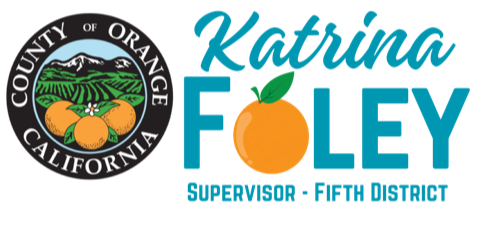
FOR IMMEDIATE RELEASE
September 24, 2024
Alyssa Napuri – Deputy Chief of Staff
(657) 334-4930 (text preferred) | Alyssa.Napuri@ocgov.com
OC Supervisor Katrina Foley Releases Statement on
Nuclear Waste Administration Act Introduction to
United States House of Representatives
ORANGE COUNTY, CA – Orange County Supervisor Katrina Foley released a statement of support following the introduction of the Nuclear Waste Administration Act by Representatives Mike Levin (D-CA 49) and August Pfluger (R-TX 11). Congressman Levin’s legislation effectively addresses the policy principles advocated for by Supervisor Foley in her role as Co-Chair of the Spent Fuel Solutions Coalition, which endorsed the legislation unanimously. To view the bill text of the Nuclear Waste Administration Act of 2024, click here. To view a one-pager fact sheet, click here.
“After decades of stagnation in Washington, Congressman Mike Levin presents a solution to the spent nuclear fuel crisis. Serving as Orange County Supervisor for the communities most impacted by the San Onofre Nuclear Generating Station, I know how desperately our communities need this bipartisan legislation passed," said Supervisor Katrina Foley. "As the new Co-Chair of the Spent Fuel Solutions Coalition, I joined coalition leaders on Capitol Hill this past summer to advocate for spent fuel action with the White House, Senate, and House of Representatives. Congressman Levin listened, and now leads our efforts in the House to find a permanent solution for spent nuclear fuel.”
The legislation effectively addresses three key policy principles, including:
- Congressional authorization to form a single-purpose, autonomous federal organization to assume management of the program from the U.S. Department of Energy (DOE).
- Authorize a flexible, consent-based repository siting program that does not designate a particular repository, whether Yucca Mountain or other.
- Revisit the linkage between CIS and a repository to allow for near-term offsite storage, with flexibility to allow input from potential host communities without defining consent.
“The federal government has a responsibility to safely manage our nation’s nuclear waste, but we’ve been caught in an impasse for decades,” said Rep. Levin. “This legislation represents a comprehensive pathway to modernize our nuclear waste program, based in consent. Our bipartisan bill would empower a new single-purpose, independent federal agency to consult and collaborate with communities to chart a path forward for safely storing and disposing of our nuclear waste. Years of inaction have left nuclear waste stored in communities all across the country – including ours – and with the federal government currently spending $2 million per day for the failure to fulfill its obligation to find a real solution. It’s clear that now is the time to act on bold solutions.”
“Nuclear energy plays an important role in our energy mix, especially as a significant increase in energy demand is projected over the next decade. However, one of the most significant challenges to broad deployment is the impasse regarding a permanent repository. West Texas has experienced the consequences of this impasse as evidenced by the Andrews County interim storage site. I am proud to introduce the ‘Nuclear Waste Administration Act of 2024’ with Rep. Levin to move our country closer to developing a permanent repository and robust fuel management plan. We cannot meet our nuclear goals without this piece of the puzzle,” said Rep. Pfluger.
“It is terrific to see progress in framing new legislation on the nation’s nuclear waste strategy. Moving the spent fuel from sites like San Onofre is long overdue. Now the even harder work begins to get this legislation passed in the House and the Senate,” said David Victor, Professor of Innovation and Public Policy at UC San Diego and Former Chair of the SONGS Community Engagement Panel.
“Legislation to accelerate a vibrant and durable nuclear waste program is necessary and I am very pleased to see this thoughtful initiative. We need to meet our obligations to current and future generations. I am hopeful this will lead to enactment soon,” said Tom Isaacs, the Lead Advisor of The Blue Ribbon Commission on America’s Nuclear Future.
###
Orange County Supervisor Katrina Foley was elected to the Board of Supervisors in 2022 to represent the newly established District 5, which includes the cities of Aliso Viejo, Costa Mesa, Dana Point, a large portion of Irvine, Laguna Beach, Laguna Hills, Laguna Niguel, Laguna Woods, Newport Beach, San Clemente, San Juan Capistrano, as well as the unincorporated areas of Coto de Caza, Emerald Bay, Ladera Ranch, Las Flores, Rancho Mission Viejo, Stonecliffe and Wagon Wheel. This is her second term on the Board of Supervisors, where she previously served District 2.
Supervisor Foley’s Board appointments include the Orange County Fire Authority (OCFA), Chair – OCFA Legislation & Public Affairs Committee, Orange County Transportation Authority (OCTA), Vice Chair – OCTA Legislative and Communications Committee, Los Angeles – San Diego – San Luis Obispo (LOSSAN) Rail Corridor Agency, Transportation Corridor Agency (TCA), TCA Joint Capital Improvements and Projects Committee, Coastal Greenbelt Authority, Newport Bay and South Orange County Watershed Executive Committees, Ocean Institute, San Onofre Nuclear Generating Station (SONGS) Community Engagement Panel, Co-Chair – Spent Fuel Solutions Coalition, Chair – Orange County Housing Finance Trust, and the Orange County Juvenile Justice Coordinating Council.







